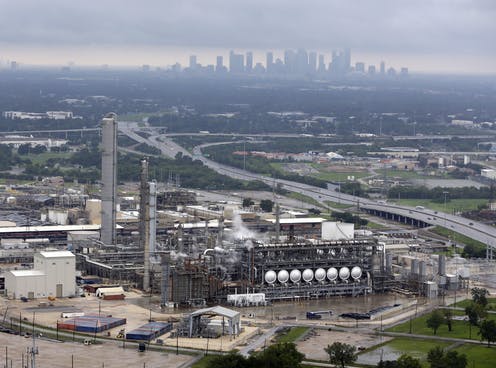U.S. consumers can expect higher fuel prices following President Donald Trump’s decision to impose tariffs on Canadian and Mexican oil. Analysts warn that the move, aimed at pressuring U.S. neighbors to curb illegal immigration and drug smuggling, could also contribute to inflation.
The U.S. imports around 4 million barrels per day (bpd) of Canadian oil—70% refined in the Midwest—and 450,000 bpd from Mexico, mainly used by Gulf Coast refiners. The new tariffs, set at 10% for Canadian energy products and 25% for Mexican imports, will increase refining costs, leading to higher prices at the pump.
GasBuddy analyst Patrick De Haan predicts noticeable fuel price hikes, with greater impacts the longer the tariffs remain. The American Fuel and Petrochemical Manufacturers Association hopes for a reversal before consumers feel the effects.
Trump’s initial 25% tariff plan was revised to lessen the impact on energy costs, but the move still disrupts North America's deeply interconnected oil market. Wells Fargo’s John LaForge highlights the challenge: Canadian oil producers rely on U.S. refiners, and Midwest refineries are optimized for heavy Canadian crude. While Gulf Coast refiners may find alternative suppliers, Midwest refiners have limited options.
East Coast drivers could also see higher costs. The region’s refining capacity covers only half its fuel demand, with the Colonial Pipeline already operating at full capacity. Irving Oil’s refinery in New Brunswick, a key supplier, now faces a 10% tariff, potentially driving up costs further.
Wholesale fuel suppliers say price increases are inevitable, as the added costs will ultimately be passed to consumers. Analysts agree: no matter how the situation unfolds, Americans should brace for rising gas prices.



 Rio Tinto Shares Hit Record High After Ending Glencore Merger Talks
Rio Tinto Shares Hit Record High After Ending Glencore Merger Talks  Dow Hits 50,000 as U.S. Stocks Stage Strong Rebound Amid AI Volatility
Dow Hits 50,000 as U.S. Stocks Stage Strong Rebound Amid AI Volatility  Sony Q3 Profit Jumps on Gaming and Image Sensors, Full-Year Outlook Raised
Sony Q3 Profit Jumps on Gaming and Image Sensors, Full-Year Outlook Raised  Uber Ordered to Pay $8.5 Million in Bellwether Sexual Assault Lawsuit
Uber Ordered to Pay $8.5 Million in Bellwether Sexual Assault Lawsuit  Nvidia, ByteDance, and the U.S.-China AI Chip Standoff Over H200 Exports
Nvidia, ByteDance, and the U.S.-China AI Chip Standoff Over H200 Exports  Trump Backs Nexstar–Tegna Merger Amid Shifting U.S. Media Landscape
Trump Backs Nexstar–Tegna Merger Amid Shifting U.S. Media Landscape  Missouri Judge Dismisses Lawsuit Challenging Starbucks’ Diversity and Inclusion Policies
Missouri Judge Dismisses Lawsuit Challenging Starbucks’ Diversity and Inclusion Policies  Trump Endorses Japan’s Sanae Takaichi Ahead of Crucial Election Amid Market and China Tensions
Trump Endorses Japan’s Sanae Takaichi Ahead of Crucial Election Amid Market and China Tensions  Alphabet’s Massive AI Spending Surge Signals Confidence in Google’s Growth Engine
Alphabet’s Massive AI Spending Surge Signals Confidence in Google’s Growth Engine  Silver Prices Plunge in Asian Trade as Dollar Strength Triggers Fresh Precious Metals Sell-Off
Silver Prices Plunge in Asian Trade as Dollar Strength Triggers Fresh Precious Metals Sell-Off  Bank of Japan Signals Readiness for Near-Term Rate Hike as Inflation Nears Target
Bank of Japan Signals Readiness for Near-Term Rate Hike as Inflation Nears Target  China Extends Gold Buying Streak as Reserves Surge Despite Volatile Prices
China Extends Gold Buying Streak as Reserves Surge Despite Volatile Prices  Nvidia CEO Jensen Huang Says AI Investment Boom Is Just Beginning as NVDA Shares Surge
Nvidia CEO Jensen Huang Says AI Investment Boom Is Just Beginning as NVDA Shares Surge  TSMC Eyes 3nm Chip Production in Japan with $17 Billion Kumamoto Investment
TSMC Eyes 3nm Chip Production in Japan with $17 Billion Kumamoto Investment  SpaceX Pushes for Early Stock Index Inclusion Ahead of Potential Record-Breaking IPO
SpaceX Pushes for Early Stock Index Inclusion Ahead of Potential Record-Breaking IPO  SpaceX Prioritizes Moon Mission Before Mars as Starship Development Accelerates
SpaceX Prioritizes Moon Mission Before Mars as Starship Development Accelerates  South Africa Eyes ECB Repo Lines as Inflation Eases and Rate Cuts Loom
South Africa Eyes ECB Repo Lines as Inflation Eases and Rate Cuts Loom 































